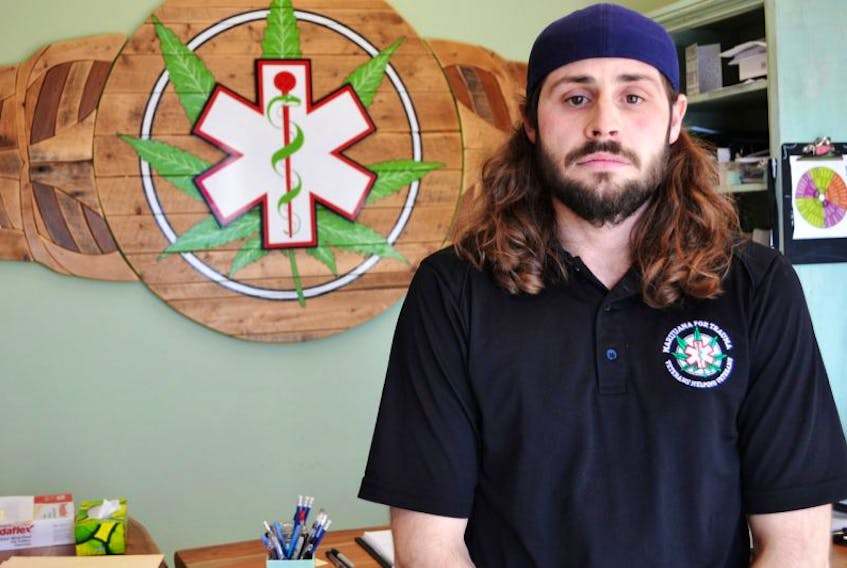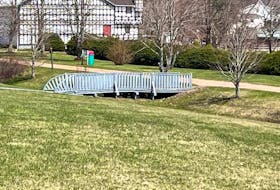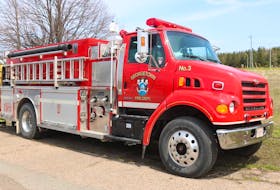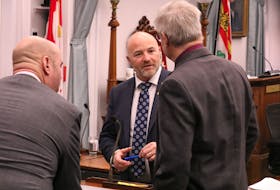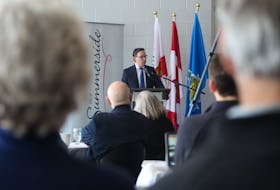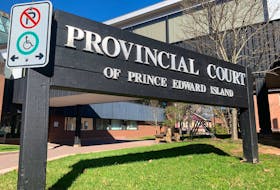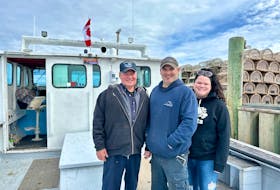Dennis MacKenzie of P.E.I. went through training with Desmond in Meaford, Ont., and the two were later posted to the same unit at CFB Gagetown and served on the same tour in Afghanistan in 2007.
MacKenzie remembers Desmond as kind, caring and funny.
“Definitely not the monster that people are thinking right now,” MacKenzie told The Guardian Thursday.
“He was genuinely one of the most sincere people I’ve ever met in my life.”
Desmond, a military veteran, was found dead in his home in Upper Big Tracadie, N.S., Tuesday evening after an apparent murder-suicide. His wife, 10-year-old daughter and mother were also found dead inside the home from gunshot wounds. RCMP have said it appeared the 33-year-old Desmond “took his own life” inside the home.
MacKenzie says he is devastated over this tragedy, especially after reading reports from family members that Desmond had been seeking help for PTSD.
“I’m pretty crushed. My heart is broken,” MacKenzie said.
“This should never happen. There’s no excuse. There’s no reason for this to ever happen.”
RELATED: N.S. probing how health system handled former soldier in apparent murder-suicide
MacKenzie himself suffers from PTSD but has found healing in medical marijuana and peer support and has been working to help fellow veterans find new pathways to healing.
This summer, he opened the first Prince Edward Island chapter of Marijuana for Trauma, an organization that provides support for veterans suffering from post-traumatic stress disorder.
MacKenzie now has over 200 clients. Some have told him they are simply not getting the support they need from Veterans Affairs or from the military for their illness.
RELATED: Seek immediate help when in mental health crisis, Dobson urges Nova Scotians
“I’m still hearing from people today being told by their chains of command that PTSD isn’t real, that this is just imaginary, that you suck it up, you move on. This is being told to them by superiors today,” MacKenzie said.
“There is help for them, but they don’t know it’s there.”
He believes veteran-run groups like his and other non-profits are offering better services for vets with PTSD.
But they are running into some roadblocks.
In November, Veterans Affairs Minister Kent Hehr announced a cut to the amount of medical marijuana provided to veterans from 10 grams to three grams a day, citing ballooning costs and concerns raised by the federal auditor general.
This cut will become effective May 21, 2017.
MacKenzie says there is no doubt in his mind this change will mean more veteran suicides.
“It’s not a matter of ‘if,’ it’s a matter of ‘when’ the first suicide happens because of this decision. It’s going to happen,” MacKenzie said.
“The government is going to have blood on their hands for this.”
RELATED: OPINION - Russell Wangersky - A tragic wake-up call
He says he hopes those who may be suffering with PTSD will reach out for help, but he continues to believe the government is not doing enough for soldiers and veterans who are ill.
“When do we have to stop proving how sick we are in order to get the help that we’re entitled to?”
In a statement to The Guardian, a spokesman for the Department of National Defense said significant investment and commitment has been made to ensure active Canadian Armed Forces members have the education and awareness programs required to help identify people at risk for mental health problems and to provide them with assistance.
“Caring for our members is a top priority. While significant progress has been achieved in the area of mental health in recent years, we know more needs to be done and strive to continuously improve our programs,” said Daniel Le Bouthillier, head of media relations for National Defense.
“The institution will continue to work hard to reduce the stigma associated with seeking help and mental illness.”
A spokesperson for Veterans Affairs Canada (VAC) stated Thursday the department is also committed to ensuring veterans, Royal Canadian Mounted Police and their families have mental health support when they need it.
VAC has a national network of around 4,000 mental health professionals who deliver mental health services to veterans and serving and released RCMP officers with post-traumatic stress disorder and other operational stress injuries.
Services include a network of 11 operational stress injury clinics, as well as a 24-hour toll-free help line, short-term face-to-face mental health counselling and referral services.
In Nova Scotia this past June, VAC and the Nova Scotia Health Authority opened the Nova Scotia Operational Stress Injury Clinic in Dartmouth, which provides full assessment, diagnosis and treatment services for veterans, members of the Canadian Armed Forces, current and former members of the RCMP and their families.
Dennis MacKenzie of P.E.I. went through training with Desmond in Meaford, Ont., and the two were later posted to the same unit at CFB Gagetown and served on the same tour in Afghanistan in 2007.
MacKenzie remembers Desmond as kind, caring and funny.
“Definitely not the monster that people are thinking right now,” MacKenzie told The Guardian Thursday.
“He was genuinely one of the most sincere people I’ve ever met in my life.”
Desmond, a military veteran, was found dead in his home in Upper Big Tracadie, N.S., Tuesday evening after an apparent murder-suicide. His wife, 10-year-old daughter and mother were also found dead inside the home from gunshot wounds. RCMP have said it appeared the 33-year-old Desmond “took his own life” inside the home.
MacKenzie says he is devastated over this tragedy, especially after reading reports from family members that Desmond had been seeking help for PTSD.
“I’m pretty crushed. My heart is broken,” MacKenzie said.
“This should never happen. There’s no excuse. There’s no reason for this to ever happen.”
RELATED: N.S. probing how health system handled former soldier in apparent murder-suicide
MacKenzie himself suffers from PTSD but has found healing in medical marijuana and peer support and has been working to help fellow veterans find new pathways to healing.
This summer, he opened the first Prince Edward Island chapter of Marijuana for Trauma, an organization that provides support for veterans suffering from post-traumatic stress disorder.
MacKenzie now has over 200 clients. Some have told him they are simply not getting the support they need from Veterans Affairs or from the military for their illness.
RELATED: Seek immediate help when in mental health crisis, Dobson urges Nova Scotians
“I’m still hearing from people today being told by their chains of command that PTSD isn’t real, that this is just imaginary, that you suck it up, you move on. This is being told to them by superiors today,” MacKenzie said.
“There is help for them, but they don’t know it’s there.”
He believes veteran-run groups like his and other non-profits are offering better services for vets with PTSD.
But they are running into some roadblocks.
In November, Veterans Affairs Minister Kent Hehr announced a cut to the amount of medical marijuana provided to veterans from 10 grams to three grams a day, citing ballooning costs and concerns raised by the federal auditor general.
This cut will become effective May 21, 2017.
MacKenzie says there is no doubt in his mind this change will mean more veteran suicides.
“It’s not a matter of ‘if,’ it’s a matter of ‘when’ the first suicide happens because of this decision. It’s going to happen,” MacKenzie said.
“The government is going to have blood on their hands for this.”
RELATED: OPINION - Russell Wangersky - A tragic wake-up call
He says he hopes those who may be suffering with PTSD will reach out for help, but he continues to believe the government is not doing enough for soldiers and veterans who are ill.
“When do we have to stop proving how sick we are in order to get the help that we’re entitled to?”
In a statement to The Guardian, a spokesman for the Department of National Defense said significant investment and commitment has been made to ensure active Canadian Armed Forces members have the education and awareness programs required to help identify people at risk for mental health problems and to provide them with assistance.
“Caring for our members is a top priority. While significant progress has been achieved in the area of mental health in recent years, we know more needs to be done and strive to continuously improve our programs,” said Daniel Le Bouthillier, head of media relations for National Defense.
“The institution will continue to work hard to reduce the stigma associated with seeking help and mental illness.”
A spokesperson for Veterans Affairs Canada (VAC) stated Thursday the department is also committed to ensuring veterans, Royal Canadian Mounted Police and their families have mental health support when they need it.
VAC has a national network of around 4,000 mental health professionals who deliver mental health services to veterans and serving and released RCMP officers with post-traumatic stress disorder and other operational stress injuries.
Services include a network of 11 operational stress injury clinics, as well as a 24-hour toll-free help line, short-term face-to-face mental health counselling and referral services.
In Nova Scotia this past June, VAC and the Nova Scotia Health Authority opened the Nova Scotia Operational Stress Injury Clinic in Dartmouth, which provides full assessment, diagnosis and treatment services for veterans, members of the Canadian Armed Forces, current and former members of the RCMP and their families.

